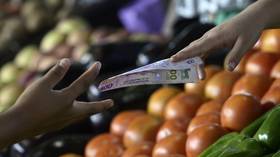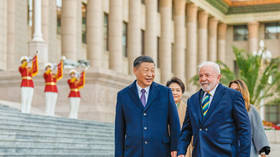Can BRICS save Argentina from disaster?

Argentina recently announced that it will be adopting the yuan, rather than the US dollar, for trade with China – the latest development in a wider global process of de-dollarization.
This comes as Argentina is currently pushing to formally join BRICS, for which it says it has the support of Brazil, India, and for which Russia and China have hinted at possible support in the past. Argentina is South America’s second-largest economy with significant potential to contribute to BRICS, but the country is also in the grips of an increasingly extreme economic crisis with runaway inflation that’s hitting new highs every week.
Can a multipolar financial system help struggling economies like Argentina? Can this move away from the dollar, and membership of BRICS, save the country from potential disaster? Yes, but only if Argentina stops flip-flopping on economic and foreign policy decision-making.
Argentina’s economic turmoil has reached desperate levels, a result of debt slavery to the International Monetary Fund, lack of access to dollars, and a historic drought that has battered crucial agricultural exports. While the official exchange rate with the US dollar is 222 pesos for 1 USD, the ‘Dollar Blue’, the unofficial rate offered on the black market, reached up to 500 Pesos in recent days. For context, in 2014 under leftist President Cristina Kirchner, the official rate was 8 pesos for 1 USD and the unofficial rate hovered around 12-14 pesos.
Annual inflation stands at 104% and Argentinians have attempted to combat this by holding their savings in US dollars, and even in cryptocurrency. The crypto market is not as bullish as it was a couple of years ago, and the Fed’s interest rate increases along with speculation within Argentina has made dollars very hard and expensive to access. More importantly, the colossal debt built up with the IMF is dollar-denominated.
Argentinian economist Gisela Cernadas, now working in China with Dongsheng News, spoke exclusively to RT and explained the perilous situation caused by dependency on the dollar.
“Argentina has been suffering, for an extended period of time, from a structurally unbalanced current account,” she said. “This means that the country needs more US dollars to function than what it has.
“To carry out its productive activities, Argentina needs immediate inputs that have to be imported, such as machinery and equipment that has to be imported in dollars,” Cernadas explained.
“Therefore, the more Argentina wants to produce, the more US dollars it needs. So, this structurally unbalanced current account puts pressure on the currency exchange market.”
Better days ahead?
In this context, the move to de-dollarize trade with China is clearly a positive move, in so far as it will ease the stranglehold that the US dollar has on the country. It will also help protect the central banks’ foreign reserves.
“Paying part of the imports from China using Chinese currency instead of the US dollar will help relieve the pressure on the current account deficit,” said Cernadas. “It’s not going to solve the structural problem of needing more foreign currency to produce and carry out its productive activity, but at least it will relieve parts of the demand they have.”
She noted that Argentina and China had $20 billion in trade in 2021 compared to a $7.4 billion deficit, and the deal would definitely help alleviate the torrid situation and US dollar deficits.
BRICS
The switch to the yuan for trade with China is already a reality. Argentinian Minister for Economy and Labor Sergio Massa says over $1 billion worth of trade will be switched into yuan. The benefits of taking this a step further and integrating their economy with those of BRICS countries are undeniable. A weakening of US-dominated financial institutions like the IMF, of which they are a victim, are also undeniable. How viable is this?
The agreement with China demonstrates the government’s commitment to a multipolar financial system. However, the political turmoil within the country means the process could prove very difficult, even with membership of BRICS.
Current President Alberto Fernandez traveled to Russia and China shortly before the Russian military operation in Ukraine. He made it clear that Argentina wanted to be part of a multipolar world in which Russia and China play crucial parts. Since then, he has been ambiguous regarding his relationship with Russia, unlike the governments of Brazil, Venezuela, Cuba, Nicaragua, and Bolivia, all of which met with Foreign Minister Sergey Lavrov on his tour of Latin America a couple of weeks ago.
Furthermore, and perhaps most importantly, Argentina will hold presidential elections in October that could dramatically change the political landscape of the country.
President Fernandez has already said he will not run for re-election. The dire economic situation of the country makes it unlikely that he or one of his allies would win outright. Polls show that the most likely outcomes are either a challenge from the left, such as from the current Vice President Cristina Kirchner, who has been critical of her own president’s lukewarm approach to the IMF and foreign policy issues, or a challenge from the conservative right from Horacio Larreta.
Kirchner’s wing of the government would deepen Argentina’s commitment to multipolarity, in line with their anti-imperialist ideology and track record of opposing the IMF. However, if the right were to win power, they would return to the slavish pro-Washington policies of ex-president Mauricio Macri, likely pulling out of their bid for BRICS membership.
An even more extreme, but equally likely, scenario would be a victory for firebrand ‘libertarian’ Javier Milei. Milei is a media personality turned congressman and he currently leads the polls with support standing at around 23%, compared to 19% for the conservative right, and 17% for the left. Milei is a controversial populist figure who describes himself as libertarian and his key proposal is to dollarize the Argentinian economy. That is to say, turn the US dollar into the national currency and abolish the peso. Obviously, this would definitively end Argentina’s role in building a future multipolar financial system.
These are all factors that BRICS countries must evaluate when discussing Argentina’s membership of the bloc. The country’s current political and economic turmoil is the consequence of the US’ neocolonial international financial dominance, but it remains to be seen if Argentina can be part of the solution.
The statements, views and opinions expressed in this column are solely those of the author and do not necessarily represent those of RT.














